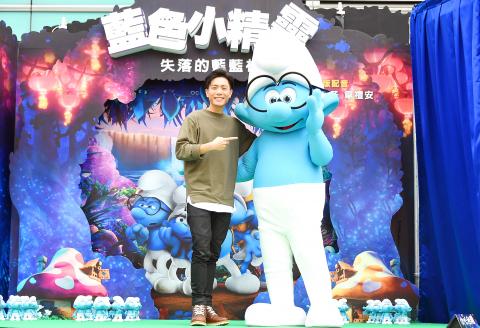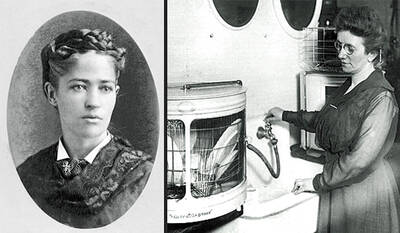The latest animated film, Smurfs: The Lost Village, has caused a wave of blue fever around the world. Singer William Wei was invited to play the voice of Brainy Smurf in the Chinese version. Dubbing for a movie for the first time, Wei says he has been a Smurf fan since childhood, and had a real sense of actually existing in the movie during the process.
The Smurfs were created by Belgian cartoonist Peyo in 1958. The village he invented is the home of blue-skinned elves, including Papa Smurf, Greedy Smurf, Lazy Smurf and Smurfette. Other main characters include the wizard Gargamel and his cat Azrael. These characters are the stuff of childhood memories for many a Taiwanese.
For Taiwan, the film company has built a unique Smurf village featuring a giant Smurf statue that costs NT$1 million, together with over 500 cute Smurf dolls. The display can be seen at the Fuxing branch of Taipei’s Sogo Department Store until April 16.

Photo: Hu Shuan-hsiang, Liberty Times
照片︰自由時報記者胡舜翔
(CNA, translated by Eddy Chang)
最新動畫電影「藍色小精靈:失落的藍藍村」在全球掀起藍色狂熱,該片中文版邀請歌手韋禮安為小聰明的角色配音。獻出配音處女秀的韋禮安表示,從小就是「藍色小精靈」的粉絲,這次擔任配音的過程,讓他覺得就像活在電影中。
「藍色小精靈」最初是比利時漫畫家培優在一九五八年所創作的,在他虛構的小精靈村莊,住著精靈老爹、小貪吃、小懶惰、小美人等。其他主角還有巫師賈不妙和他的大笨貓,他們是許多台灣觀眾童年的回憶。
這次片商也打造全台唯一的「藍藍村」,展出造價百萬的巨型「藍色小精靈」雕像,更有超過五百隻的超萌小精靈,「藍藍村」即日起至四月十六日在台北Sogo復興館展出。(中央社)

A: Wow, US climber Alex Honnold has announced that he’s going to free-climb Taipei 101 on Jan. 24. And the challenge, titled “Skyscraper Live,” will be broadcast worldwide live on Netflix at 9am. B: Oh my goodness, Taipei 101 is the world’s tallest green building. Is he crazy? A: Honnold is actually the climber in the 2019 film “Free Solo” that won an Oscar for best documentary, and was directed by Taiwanese-American Jimmy Chin and his wife. He’s a legendary climber. B: Didn’t Alain Robert, “the French Spiderman,” also attempt to scale Taipei 101 in 2004? A: Yes, but

For many introverts, shy individuals and people with social anxiety, mingling at parties is often draining or arouses uncomfortable emotions. The internal debate about whether or not to attend large get-togethers can get especially intense during the holiday season, a time when many workplaces celebrate with cocktail hours, gift exchanges and other forms of organized fun. “Some people are just not party people,” City University of New York social work professor Laura MacLeod said. “With a workplace holiday party, there’s a pressure to be very happy and excited. It’s the end of the year, it’s the holidays, we’re all feeling grand.

Twelve dinner guests have just left your house, and now a tower of greasy plates stares back at you mockingly. Your hands are already wrinkling as you think about scrubbing each dish by hand. This nightmare bothered households for centuries until inventors in the 19th century tried to solve the problem. The first mechanical dishwashers, created in the 1850s, were wooden machines with hand cranks that splashed water over dishes. Unfortunately, these early devices were unreliable and often damaged delicate items. The real breakthrough came in the 1880s thanks to Josephine Cochrane, a wealthy American socialite. According to her own account,

A: There are always adventurers who want to conquer Taipei 101 as a world-class landmark. Didn’t someone once parachute from the top of it? B: Yeah, that’s right. Austrian extreme sportsman Felix Baumgartner once parachuted from the rooftop observation deck in 2007 without permission. He died earlier last year in a powered paragliding crash at the age of 56. A: Hollywood superstar Tom Cruise also almost jumped off Taipei 101 for “Mission Impossible 3.” B: What? But I didn’t see the building in the movie. A: The news says that the film’s producers applied to the Taipei City